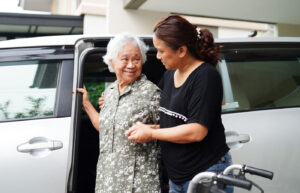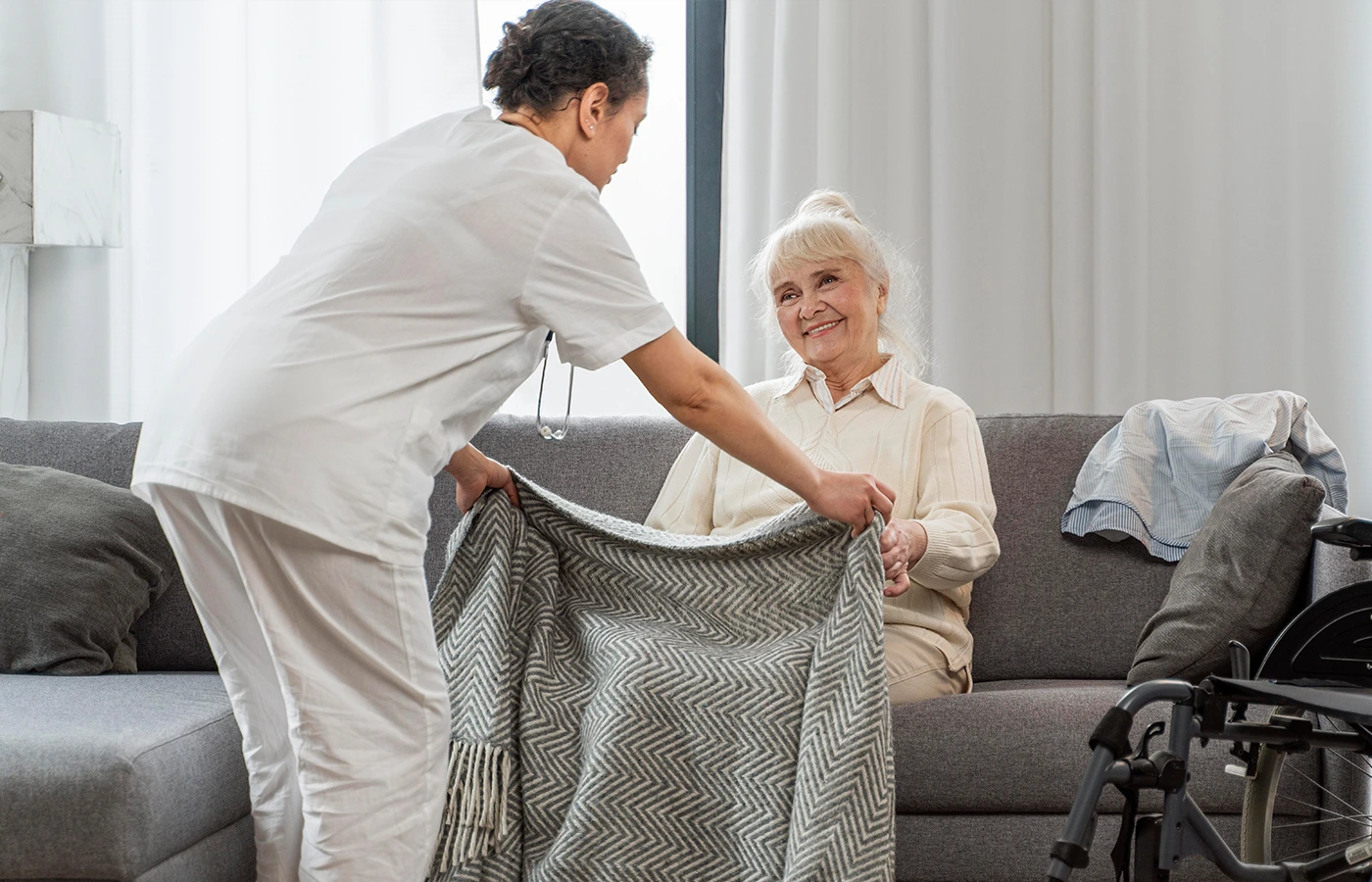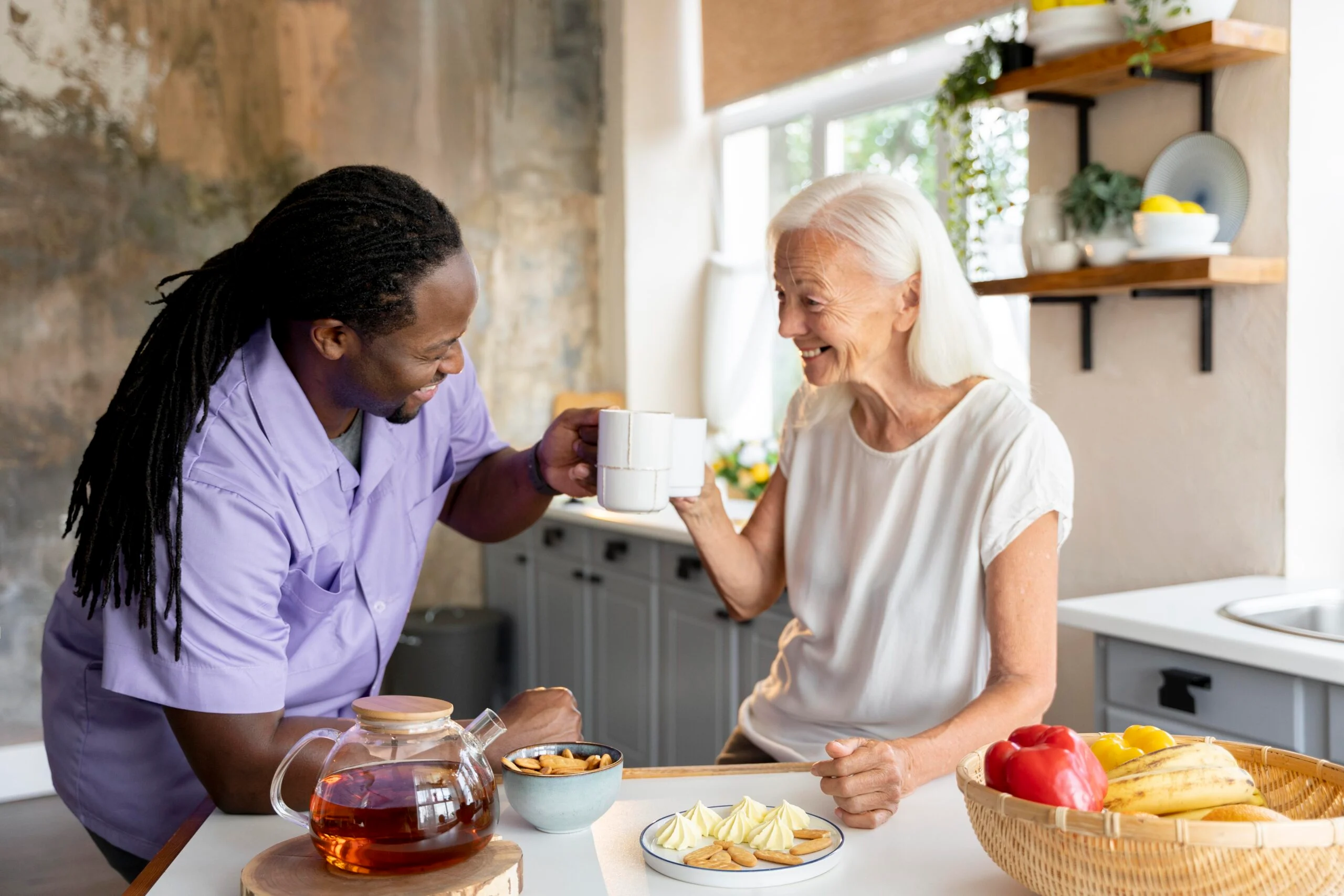- Personal Care
-
Bathing and Grooming: Assistance with personal hygiene tasks, such as bathing, grooming, and dressing, is essential for many elderly individuals who may face mobility issues or other limitations.
-
Medication Reminders: While personal care assistants are not typically licensed to administer medication, they help remind the elderly to take their prescribed medications on time and monitor for any signs of adverse reactions.
-
Mobility Support: Many elderly individuals need help moving around their homes, whether it’s walking, using a wheelchair, or transferring from one position to another. Caregivers provide physical support to prevent falls and accidents.
-
Health Monitoring: Although they aren’t medical professionals, caregivers may assist in monitoring basic health metrics like weight, temperature, and blood pressure, keeping track of changes that could indicate health concerns.
-
- Household Assistance
-
Meal Preparation: Nutritious meals are vital for maintaining the health of the elderly, but many struggle with cooking due to physical limitations. PCAs assist with meal planning, preparation, and feeding if necessary.
-
Light Housekeeping: Maintaining a clean and safe living environment is essential for elderly individuals. PCAs often help with light housekeeping duties, such as laundry, tidying up, and ensuring that the home is free of hazards.
-
Errands and Transportationt: For elderly individuals who no longer drive or have difficulty getting around, PCAs may assist with shopping for groceries, picking up medications, and accompanying them to appointments.
-
- Ageing
- Reducing Hospital Readmissions
- Supporting Family Caregivers
- Flexibility and Customization of Care

Emotional and Social Support
In addition to physical assistance, the emotional well-being of the elderly is a crucial aspect of PCA services. Isolation and loneliness are common issues faced by elderly individuals, especially those who live alone or are socially disconnected. PCAs offer companionship, engage in conversations, and encourage social activities, which can have a significant impact on mental health.
In 2024, the importance of social connection has been recognized more than ever. Research consistently shows that loneliness can have serious negative effects on both physical and mental health, particularly in elderly populations. They often bridge the gap, providing not only practical care but also a compassionate human connection that enhances the overall quality of life.
The Impact of PCAs on Elder Care in 2024
The role of Personal Care Assistants has evolved to meet the changing demands of elder care. As healthcare shifts towards more personalized and in-home care models, PCAs are becoming indispensable in addressing the growing needs of an ageing population.
Here are some key impacts:
Many elderly individuals prefer to remain in their homes rather than move into assisted living facilities or nursing homes. PCAs enable ageing in place by providing essential support that allows individuals to live independently for longer periods. This not only enhances the dignity and quality of life of the elderly but also reduces the financial burden associated with institutional care.
In 2024, the trend of ageing in place is stronger than ever, thanks in part to advancements in home-based care technology, improved access to services, and a cultural shift toward personalized care. These perosnal caregiver are at the heart of this movement, ensuring that the elderly receive the necessary assistance without having to leave the comfort of their own homes.
PCAs play a crucial role in helping elderly individuals manage chronic conditions, recover from surgeries, and adhere to prescribed care plans. By assisting with medication reminders, monitoring health metrics, and encouraging healthy habits, PCAs help prevent complications that could lead to hospital readmissions.
With healthcare systems increasingly focused on reducing hospital admissions and improving patient outcomes, the work of PCAs in elder care has become even more vital in 2024. Their presence in the home ensures that elderly individuals receive consistent care, which leads to better health outcomes and reduces the strain on hospitals and medical facilities.
Caring for an elderly family member can be emotionally and physically exhausting for family caregivers. PCAs provide much-needed respite by taking on many of the caregiving responsibilities. This allows family members to rest, work, or focus on other aspects of their lives without feeling overwhelmed by caregiving duties.
In 2024, the demand for PCA services has grown as more families recognize the need for professional support in caring for their elderly loved ones. This support not only alleviates caregiver burnout but also ensures that the elderly receive professional, dedicated care.
One of the most significant advantages of caregiver services is the flexibility they offer. Care plans are tailored to the specific needs of each individual, whether they require full-time assistance or just a few hours of help each day. This personalized approach ensures that elderly individuals receive the right level of care, whether it’s for mobility assistance, meal preparation, or companionship.
As the healthcare landscape continues to evolve in 2024, the demand for customized care solutions has increased. PCAs, with their adaptable skill sets, are ideally positioned to meet these changing needs. By offering flexible care options, PCAs help elderly individuals maintain their independence while receiving the assistance they require.
The Future of PCA Services in Elder Care
Looking ahead, the role of PCAs in elder care will likely continue to expand as the elderly population grows and healthcare priorities shift further toward home-based care.
- Technological Integration: In 2024, technology is becoming an integral part of elder care, from telehealth services to platforms like Kizuna, which acts as a marketplace connecting families with caregivers, helping them find the right care for their loved ones with utmost ease.
- Increased Training and Specialization: As the needs of the elderly population become more complex, there will be an increasing demand for caregivers with specialized training in areas like dementia care, mobility support, and chronic disease management. This trend is likely to grow in the coming years, as more caregivers receive advanced training to meet the diverse needs of their clients.
- Policy and Regulation: Governments are recognizing the critical role that caregivers play in elder care. In 2024, there has been a push for better regulation, certification, and support for these professionals, ensuring they are adequately trained and compensated for the essential work they do.
Kizuna: Elder Care Made Simple and Secure
If you’re on the lookout for the right care for an elderly loved one, platforms like Kizuna make the process effortless in 2024. Kizuna ensures that caregivers are thoroughly verified, undergoing comprehensive background checks that provide peace of mind about their trustworthiness and reliability.
Caregivers are also highly motivated, as they receive the majority of their earnings, which drives them to deliver exceptional care. Additionally, Kizuna provides dedicated care coordinators who offer ongoing support and education for both families and caregivers, helping you navigate the complexities of elder care with ease.
All of these elements combine to make finding the perfect caregiver simple, reliable, and stress-free.
FAQs:
How do I know if a PCA is the right fit for my family?
Choosing the right assistance involves reviewing their qualifications, experience, and compatibility with your loved one. It’s also helpful to read reviews, ask for references, and conduct interviews to ensure the caregiver aligns with your family’s needs and expectations.
You can also be a part of dedicated platforms like Kizuna, which is a marketplace to find all available caregivers with their information, details, reviews, background, etc.
How can I find PCAs for elder care near me?
Do niche organic searches like dedicated caregivers in San Francisco, the North Bay Area, and even in Marin County, Sonoma County, and other such specific locations to provide personalized care.
Or use a dedicated platform that filters searches by location to make the process easier, more convenient, and error-free.
How do I know if I need a PCA?
You may need a PCA if you or someone you know requires assistance at home with activities of daily living, such as:
- Dressing, feeding, personal hygiene, control activities like balancing or sitting, ambulations or movement exercises
- Light house cleaning
- Planning and cooking food
- Shopping for essential and non-essential items
- Transport to and from doctor’s and other appointments.
How can I find a PCA in the North Bay Area?
You can find caregivers in the North Bay Area by using online platforms that specialize in caregiving services. Look for local directories, community resources, or dedicated marketplaces like Kizuna, where you can filter searches by location and find caregivers with relevant experience and qualifications.
Are PCAs in Marin County and Sonoma County trained and certified?
Yes, many caregivers in Marin County are trained and certified in personal care and elder support. It’s important to verify their credentials and experience to ensure they can provide the level of care your loved one needs.
Can I get a PCA for short-term care in Marin County and Sonoma County?
Yes, many caregivers in Sonoma County offer flexible arrangements, including short-term care. Whether you need temporary assistance or a caregiver for a few hours a week, you can find options that suit your needs through local services or platforms like Kizuna.

“Caring for our seniors is perhaps the greatest responsibility we have. Those who walked before us have given so much and made possible the life we all enjoy.” — Senator John Hoeven.
What is a Personal Care Assistant (PCA)?
A personal care assistant is a professional who provides essential support to individuals who may struggle with everyday tasks due to age, illness, disability, or other physical challenges. Specifically in the context of elder care, PCAs are trained to help elderly individuals maintain their independence while ensuring their safety, comfort, and overall well-being in the home environment. The role of a PCA includes a wide range of duties, from assisting with basic activities of daily living (ADLs) to offering companionship and emotional support.
In 2024, the role of a PCA has gained even more significance due to the increasing elderly population, growing demand for home-based care, and shifts in healthcare delivery, which prioritize in-home services over institutional settings. As more elderly individuals express a desire to age in place, the services of a PCA provide a vital solution for maintaining a higher quality of life while reducing the burden on family caregivers.
Responsibilities of a PCA
Personal Care Assistants are versatile in their roles, offering various services tailored to the unique needs of each individual. Their responsibilities can be divided into two primary categories: personal care and household assistance.
- Personal Care
-
Bathing and Grooming: Assistance with personal hygiene tasks, such as bathing, grooming, and dressing, is essential for many elderly individuals who may face mobility issues or other limitations.
-
Medication Reminders: While personal care assistants are not typically licensed to administer medication, they help remind the elderly to take their prescribed medications on time and monitor for any signs of adverse reactions.
-
Mobility Support: Many elderly individuals need help moving around their homes, whether it’s walking, using a wheelchair, or transferring from one position to another. Caregivers provide physical support to prevent falls and accidents.
-
Health Monitoring: Although they aren’t medical professionals, caregivers may assist in monitoring basic health metrics like weight, temperature, and blood pressure, keeping track of changes that could indicate health concerns.
-
- Household Assistance
-
Meal Preparation: Nutritious meals are vital for maintaining the health of the elderly, but many struggle with cooking due to physical limitations. PCAs assist with meal planning, preparation, and feeding if necessary.
-
Light Housekeeping: Maintaining a clean and safe living environment is essential for elderly individuals. PCAs often help with light housekeeping duties, such as laundry, tidying up, and ensuring that the home is free of hazards.
-
Errands and Transportationt: For elderly individuals who no longer drive or have difficulty getting around, PCAs may assist with shopping for groceries, picking up medications, and accompanying them to appointments.
-

Emotional and Social Support
In addition to physical assistance, the emotional well-being of the elderly is a crucial aspect of PCA services. Isolation and loneliness are common issues faced by elderly individuals, especially those who live alone or are socially disconnected. PCAs offer companionship, engage in conversations, and encourage social activities, which can have a significant impact on mental health.
In 2024, the importance of social connection has been recognized more than ever. Research consistently shows that loneliness can have serious negative effects on both physical and mental health, particularly in elderly populations. They often bridge the gap, providing not only practical care but also a compassionate human connection that enhances the overall quality of life.
The Impact of PCAs on Elder Care in 2024
The role of Personal Care Assistants has evolved to meet the changing demands of elder care. As healthcare shifts towards more personalized and in-home care models, PCAs are becoming indispensable in addressing the growing needs of an ageing population.
Here are some key impacts:
- Ageing
Many elderly individuals prefer to remain in their homes rather than move into assisted living facilities or nursing homes. PCAs enable ageing in place by providing essential support that allows individuals to live independently for longer periods. This not only enhances the dignity and quality of life of the elderly but also reduces the financial burden associated with institutional care.
In 2024, the trend of ageing in place is stronger than ever, thanks in part to advancements in home-based care technology, improved access to services, and a cultural shift toward personalized care. These perosnal caregiver are at the heart of this movement, ensuring that the elderly receive the necessary assistance without having to leave the comfort of their own homes.
- Reducing Hospital Readmissions
PCAs play a crucial role in helping elderly individuals manage chronic conditions, recover from surgeries, and adhere to prescribed care plans. By assisting with medication reminders, monitoring health metrics, and encouraging healthy habits, PCAs help prevent complications that could lead to hospital readmissions.
With healthcare systems increasingly focused on reducing hospital admissions and improving patient outcomes, the work of PCAs in elder care has become even more vital in 2024. Their presence in the home ensures that elderly individuals receive consistent care, which leads to better health outcomes and reduces the strain on hospitals and medical facilities.
- Supporting Family Caregivers
Caring for an elderly family member can be emotionally and physically exhausting for family caregivers. PCAs provide much-needed respite by taking on many of the caregiving responsibilities. This allows family members to rest, work, or focus on other aspects of their lives without feeling overwhelmed by caregiving duties.
In 2024, the demand for PCA services has grown as more families recognize the need for professional support in caring for their elderly loved ones. This support not only alleviates caregiver burnout but also ensures that the elderly receive professional, dedicated care.
- Flexibility and Customization of Care
One of the most significant advantages of caregiver services is the flexibility they offer. Care plans are tailored to the specific needs of each individual, whether they require full-time assistance or just a few hours of help each day. This personalized approach ensures that elderly individuals receive the right level of care, whether it’s for mobility assistance, meal preparation, or companionship.
As the healthcare landscape continues to evolve in 2024, the demand for customized care solutions has increased. PCAs, with their adaptable skill sets, are ideally positioned to meet these changing needs. By offering flexible care options, PCAs help elderly individuals maintain their independence while receiving the assistance they require.
The Future of PCA Services in Elder Care
Looking ahead, the role of PCAs in elder care will likely continue to expand as the elderly population grows and healthcare priorities shift further toward home-based care.
- Technological Integration: In 2024, technology is becoming an integral part of elder care, from telehealth services to platforms like Kizuna, which acts as a marketplace connecting families with caregivers, helping them find the right care for their loved ones with utmost ease.
- Increased Training and Specialization: As the needs of the elderly population become more complex, there will be an increasing demand for caregivers with specialized training in areas like dementia care, mobility support, and chronic disease management. This trend is likely to grow in the coming years, as more caregivers receive advanced training to meet the diverse needs of their clients.
- Policy and Regulation: Governments are recognizing the critical role that caregivers play in elder care. In 2024, there has been a push for better regulation, certification, and support for these professionals, ensuring they are adequately trained and compensated for the essential work they do.
Kizuna: Elder Care Made Simple and Secure
If you’re on the lookout for the right care for an elderly loved one, platforms like Kizuna make the process effortless in 2024. Kizuna ensures that caregivers are thoroughly verified, undergoing comprehensive background checks that provide peace of mind about their trustworthiness and reliability.
Caregivers are also highly motivated, as they receive the majority of their earnings, which drives them to deliver exceptional care. Additionally, Kizuna provides dedicated care coordinators who offer ongoing support and education for both families and caregivers, helping you navigate the complexities of elder care with ease.
All of these elements combine to make finding the perfect caregiver simple, reliable, and stress-free.
FAQs:
How do I know if a PCA is the right fit for my family?
Choosing the right assistance involves reviewing their qualifications, experience, and compatibility with your loved one. It’s also helpful to read reviews, ask for references, and conduct interviews to ensure the caregiver aligns with your family’s needs and expectations.
You can also be a part of dedicated platforms like Kizuna, which is a marketplace to find all available caregivers with their information, details, reviews, background, etc.
How can I find PCAs for elder care near me?
Do niche organic searches like dedicated caregivers in San Francisco, the North Bay Area, and even in Marin County, Sonoma County, and other such specific locations to provide personalized care.
Or use a dedicated platform that filters searches by location to make the process easier, more convenient, and error-free.
How do I know if I need a PCA?
You may need a PCA if you or someone you know requires assistance at home with activities of daily living, such as:
- Dressing, feeding, personal hygiene, control activities like balancing or sitting, ambulations or movement exercises
- Light house cleaning
- Planning and cooking food
- Shopping for essential and non-essential items
- Transport to and from doctor’s and other appointments.
How can I find a PCA in the North Bay Area?
You can find caregivers in the North Bay Area by using online platforms that specialize in caregiving services. Look for local directories, community resources, or dedicated marketplaces like Kizuna, where you can filter searches by location and find caregivers with relevant experience and qualifications.
Are PCAs in Marin County and Sonoma County trained and certified?
Yes, many caregivers in Marin County are trained and certified in personal care and elder support. It’s important to verify their credentials and experience to ensure they can provide the level of care your loved one needs.
Can I get a PCA for short-term care in Marin County and Sonoma County?
Yes, many caregivers in Sonoma County offer flexible arrangements, including short-term care. Whether you need temporary assistance or a caregiver for a few hours a week, you can find options that suit your needs through local services or platforms like Kizuna.




